2016 下半年辽宁教师资格考试初中英语学科知识与教学能
力真题及答案
注意事项:
1.考试时间为 120 分钟,满分 150 分。
2.请按规定在答题卡上填涂、作答。在试卷上作答无效,不予评分。
一、单项选择题(本大题共 30 小题,每小题 2 分。共 60 分)
在每小题列出的四个备选项中选择一个最佳答案。请用 28 铅笔把答题卡上对应题目的答
案字母按要求涂黑。错选、多选或未选均无分。
1. It was such a (an) __________ when they met each other in Beijing because
each thought that the other was still in Hong Kong.
A. occurrence
B. chance
C. coincidence
D. occasion
2. When you come to our city you can see__________ yourself how beautiful it
is.
A. in
B. for
C. to
D. with
3. We have no trust in him because he has never__________ the grandiose
promises he makes.
A. delivered on
B. eaten off
C. forgotten about
D. abided by
4. With the villager __________ the way, we had no trouble __ the cottage.
�
A. to lead; finding
B. to lead; to fred
C. leading; to find
D. leading; finding
5. A new park has sprung up in __________ was a wasteland ten years ago.
A. that
B. what
C. which
D. where
6. He said he' d phone you __________ he got home.
A. the moment
B. the moment when
C. at the moment
D. at the moment when
7. Which indefinite article "a" should be read emphatically in the following
sentences?
A. He is a handsome boy, but not smart.
B. He is not a suspect, he is the suspect.
C. He bought a cartoon book for his son.
D. He is talking with a middle-aged man.
8.Which of the following indicates a more polite request or invitation?
�
9. Due to the __________influence, some Chinese learners of English wrongly
passivize intransitive verbs like "die", as in "John was died last year".
A. intedingual
B. intercultural
C. intralingual
D. intmcultural
10. tells where a person comes from, whereas __________ tells what he does.
A. Dialect; register
B. Style; genre
C. Dialect; style
D. Register; genre
11. Which of the following assumptions fails to describe the nature of
vocabulary or vocabulary learning?
A. Words are best learned in context.
B. A lexical item can be more than one word.
C. All words in one language have equivalents in another.
D. Learning a word includes learning its form, meaning and use.
12. When a teacher creates a real life situation for his students to discuss,
he expects them not to focus on__________ too much.
A. form
B. use
C. meaning
D. function
13. it is suggested that teachers should not interrupt students for error
correction when the activity aims at__________.
A. accuracy
B. fluency
�
C. complexity
D. cohesion
14. When asking students to quickly run their eyes over a whole text to get
the gist, we are training their skill of__________.
A. scanning
B. mapping
C. predicting
D. skimming
15.Teachers who adont the __________model for reading comprehension may start
teaching a text by introducing new vocabulary and structures.
A. parallel
B. serial
C. too-down
D. bottom-up
16. It is suggested that lower-level EFL learners learn to read by reading
__________ materials.
A. simple and authentic
B. academic and authentic
C. original and classical
D. classical and authentic
17. When asking students to arrange the scrambled sentences into a logical
paragraph, the teacher is focusing on __________.
A. reading skills
B. critical think
C. proofreading skills
D. textual coherence
18. Which of the following is a typical feature of formal writing?
�
A. Archaic words are usually preferred.
B. The precision of language is a priority.
C. Short and incomplete sentences are preferred.
D. An intimate relationship with the audience is established.
19. Which of the following writing activities may be used to develop students'
skill of planning?
A. Editing their writing in groups.
B. Self-checking punctuations in their writing.
C. Sorting out ideas and putting them in order.
D. Cross-checking the language in their writing.
20. In trying to get across a message, an EFL learner may use __________
strategies to make up for a lack of knowledge of grammar or vocabulary.
A. communicative
B. cognitive
C. resourcing
D. affective
请阅读 Passage 1。完成第 21-25 小题。
Passage 1
Hidden Valley looks a lot like the dozens of other camps that dot the woods of
central Maine.
There's a lake, some soccer fields and horses. But the campers make the
difference. They're all American parents who have adopted kids from China.
They're at Hidden Valley to find bridges from their children's old worlds to
the new. Diana Becker watches her 3-year-old daughter Mika dance to a Chinese
version of "Twinkle, Twinkle Little Star." "Her soul is Chinese," she says,
"but really she' s growing up American."
Hidden Valley and a handful of other"culture camps" serving families with
children from overseas reflect the huge rise in the number of foreign
adoptions, from 7,093 in 1990 to 15,774 last year. Most children come from
Russia (4,491 last year) and China (4,206) but there are also thousands of
others adopted annually from South America, Asia and Eastern Europe. After
cutting through what can be miles of red tape, parents often come home to find
�
a new predicament. "At first you think, 'I need a child'," says Sandy Lachter
of Washington, D.C., who with her husband, Steve, adopted Amelia,5, from China
in 1995. "Then you think, 'What does the child need?'"
The culture camps give families a place to find answers to those kinds of
questions. Most grew out of local support groups; Hidden Valley was started
last year by the Boston chapter of Families with Children from China, which
includes 650 families, while parents address weighty issues like how to raise
kids in a mixed-race family, their children just have fun riding horses,
singing Chinese songs or making scallion pancakes. "My philosophy of camping
is that they could be doing anything, as long as they see other Chinese kids
with white parents," says the director, Peter Kassen, whose adopted daughters
Hope and Lily are 6 and 4.
The camp is a continuation of language and dance classes many of the kids
attend during the year.
"When we rented out a theater for'Mulan,' it was packed," says Stephen Chen of
Boston, whose adopted daughter Lindsay is 4. Classes in Chinese language, art
and calligraphy are taught by experts, like Renne Lu of the Greater Boston
Chinese Cultural Center. "Our mission is to preserve the heritage," Lu says.
Kids who are veteran campers say the experience helps them understand their
complex heritage. Sixteen-year-old Alex was born in India and adopted by Kathy
and David Brinton of Boulder, Colo., when he was 7. "I went through a stage
where I hated India, hated everything about it," he says."You just couldn't
mention India to me." But after six sessions at the East India Colorado
Heritage Camp, held at Snow Mountain Ranch in Estes Park, Colo., he hopes to
travel to India after he graduates from high school next year.
21. What is the author's primary purpose in writing the passage?
A. Revealing the procedures for foreign adoptions.
B. Recounting an amazing childhood camping experience.
C. Investigating how Hidden Valley serves foreign adoption families.
D. Demonstrating how culture camps help foreign adoption families.
Which
of
is
22.
word"predicament" in PARAGRAPH TWO?
following
the
closest
in
meaning
to
the
underlined
A. Dilemma.
B. Status.
C. Contradiction.
D. Consequence.
�
23. Where are the adopted kids served by Hidden Valley from?
A. Russia.
B. India.
C. China.
D. America.
24. What can a culture camp help to do according to Peter Kassen?
A. It helps the adopted kids form a correct attitude to their complex heritage.
B. It helps the Chinese children have fun with their American parents.
C. It helps the Americans increase the adoption from Russia and China.
D. It helps the American parents adopt children from other countries.
25. What can be inferred about Alex from the last paragraph?
A. The culture camps caused Alex to hate everything about India.
B. The East India Colorado Heritage Camp led to Alex' s immigration.
C. Hidden Valley served as a link between Alex' s old world and the new.
D. The culture camps helped Alex better understand his mixed-race family.
请阅读 Passage 2,完成第 26-30 小题。
Passage 2
Birds are a critical part of our ecological system. But more than ever, birds
are threatened by human pollution and climate change.
We need the birds to eat insects, move seeds and pollen around, transfer
nutrients from sea to land, clean up after the mass death of the annual
Pacific salmon runs, or when a wild animal falls anywhere in a field or forest.
How could we enjoy spring without the birds flitting busily in our garden or
dropping by to check out the flowers in our urban window box? Can you
contemplate America without the soaring bald eagle, or even those scavengers
like the pigeons and gulls that clean up discarded food scraps on our city
streets and waterfronts? How diminished our lives would be without them?
Scavenging eagles and condors need hunters to behave responsibly and bury, or
remove, the remains of any shot deer peppered with fragments of lead bullets.
�
Loons, ducks and other water birds will be poisoned by lead bullets and lead
fishing sinkers if we allow such objects to drop in their feeding space.
All sea and shore birds, even the puffins and guillemots of the otherwise
pristine Aleutians,need us to make sure that no other heavy metals, like
mercury and cadmium, are dumped in rivers and make their way across the oceans.
Birds like the terns, knots and shearwaters that migrate between the far north
and deep, deep, south of our planet need people everywhere to cease and desist
from filling in their wetland fuel stops and rest stations, and from
constructing golfing resorts and factories in their feeding and breeding
grounds.
Seabirds are among the most endangered vertebrate species on the planet, with
the International Union for Conservation of Nature classifying 97 species as
globally threatened, and 17 in the highest category of critically threatened.
Of
pelicans
the
spectacular, but slow-breeding albatross.
greatest
southern
concern
oceans
the
and
are
the
of
Plastic bags must be eliminated from natural environments so sea and shore
birds don't mistakenly carry such debris back to feed their chicks, with
invariably lethal consequences. The albatross, cormorants and herons need us
to stop over-fishing and compromising their normal food supply.
The pelicans, penguins and all the birds that inhabit, or visit, our
coastlines need us to ensure that we do not dump oil into gulfs and bays, or
release so much carbon dioxide into the atmosphere that the oceans turn acidic
and we lose the mussels and oysters, the mass of calcareous plankton that
feeds so many creatures, and the coral reefs that nurture enormous numbers of
edible species.
Think about it: We share this small green planet. As they fly, feed and nest,
the birds monitor the health of the natural world for us, provided that we, in
turn, make the effort to access that key information.
The birds and humans are both large, complex and ultimately vulnerable
organisms that inhabit the top of the food chain. At the end of the day, their
fate will be our fate.
Which
26.
word"contemplate" in PARAGRAPH THREE?
following
the
is
of
closest
in
meaning
to
the
underlined
A. Live in.
B. Think about.
C. Arrive at.
D. Comment on.
�
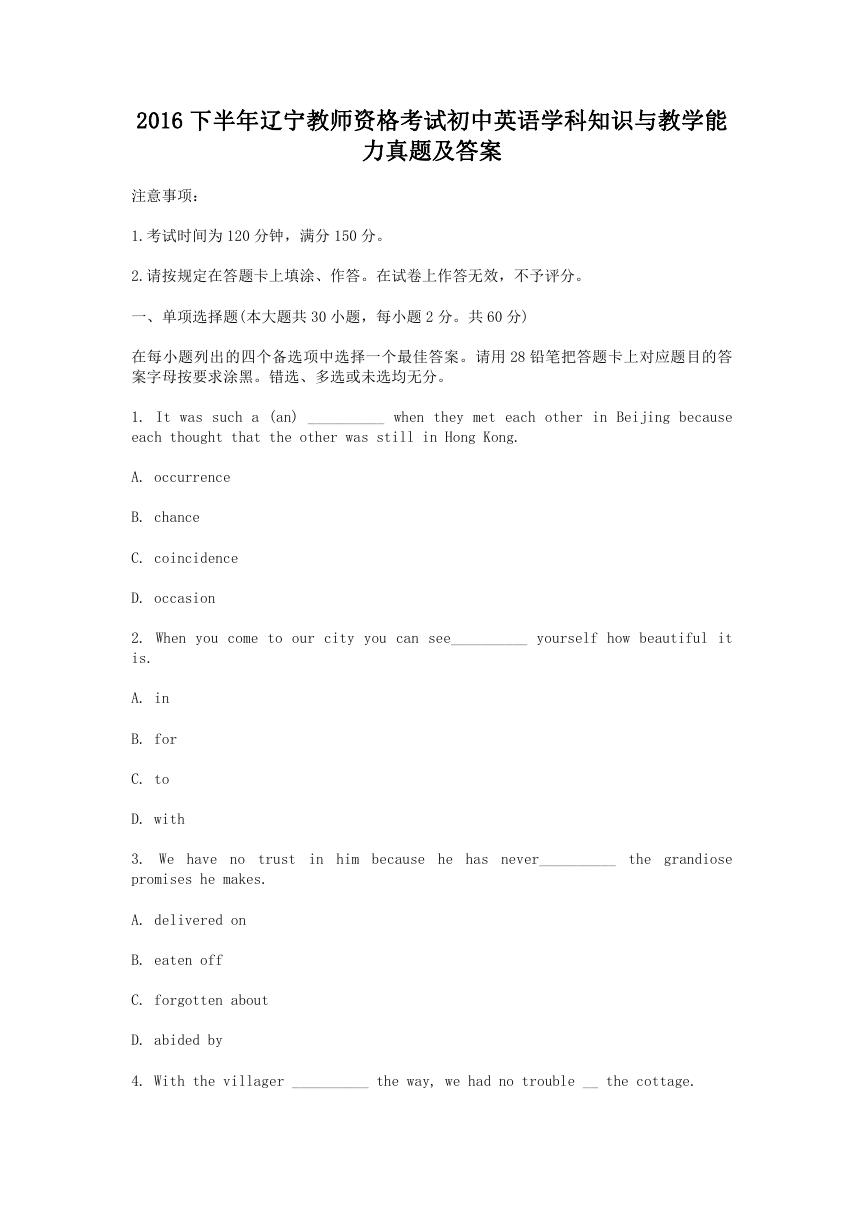
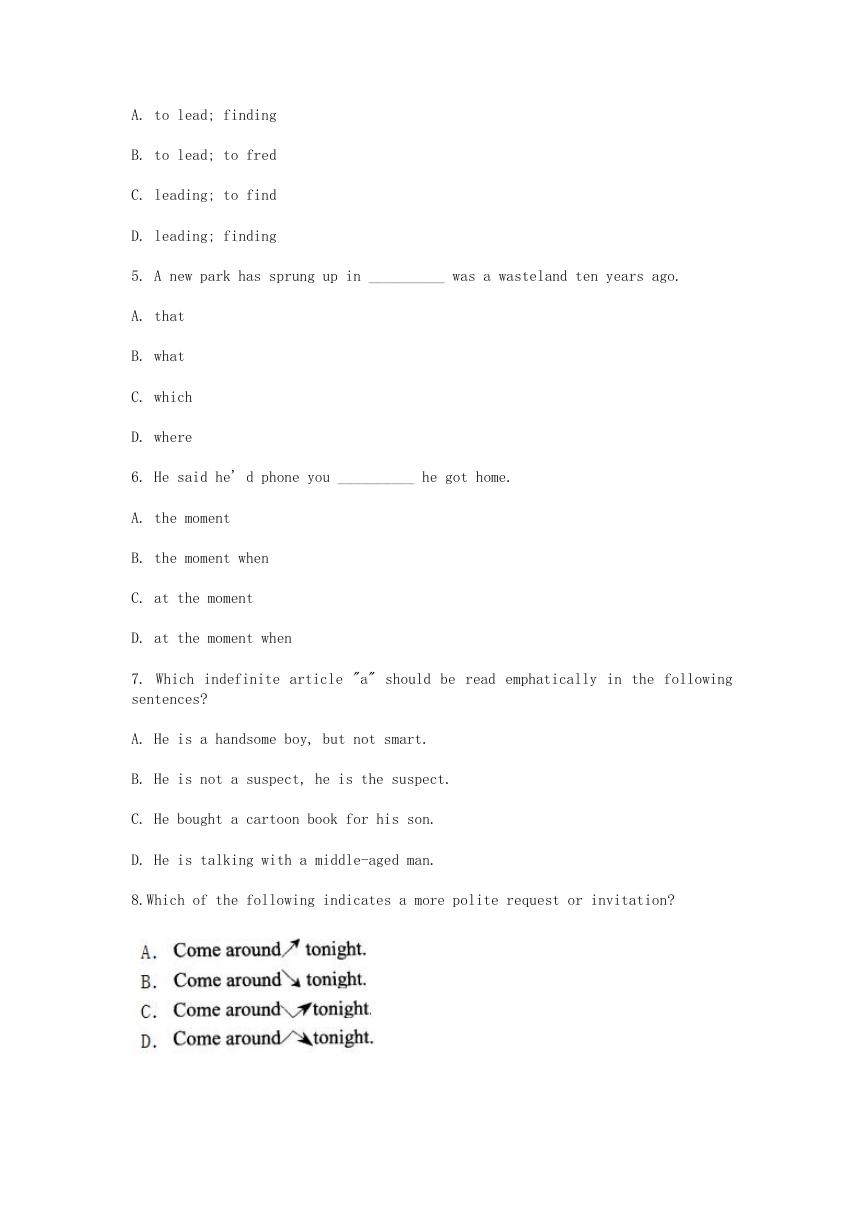
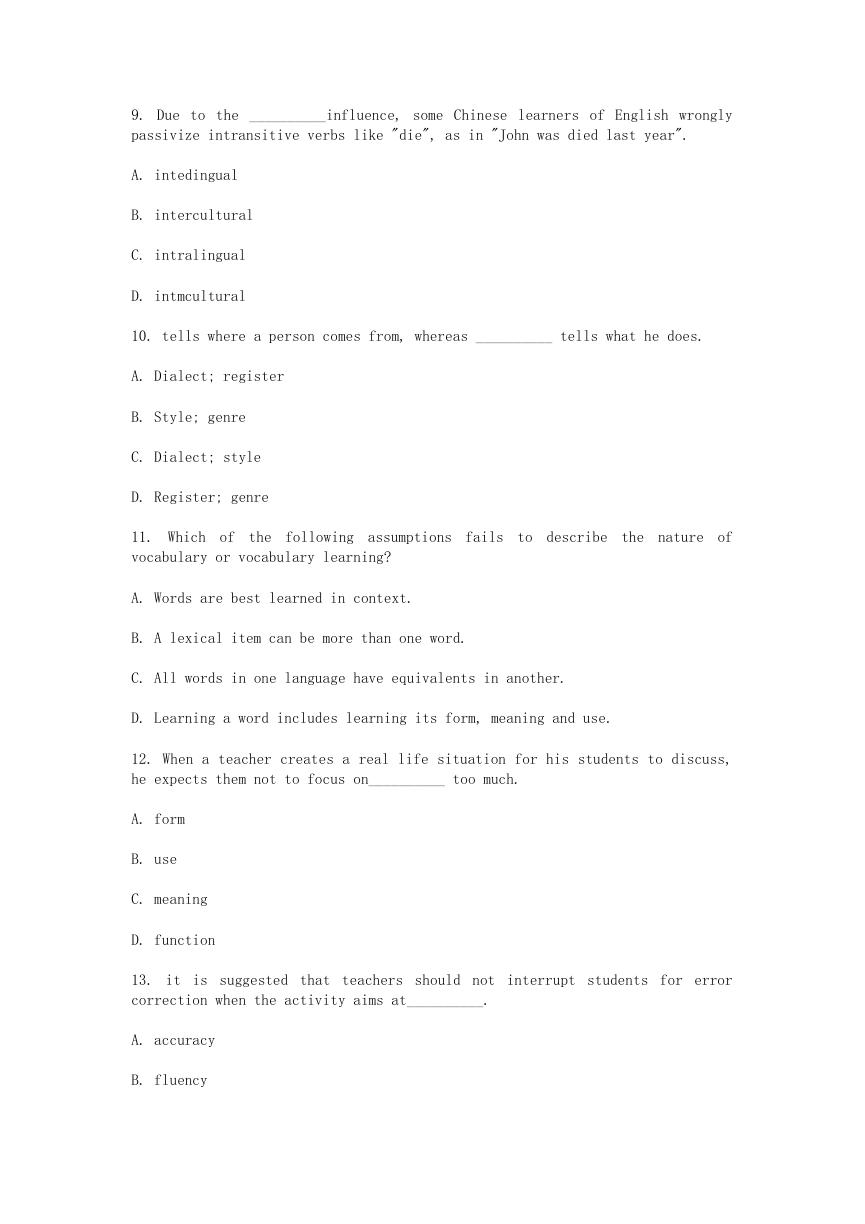
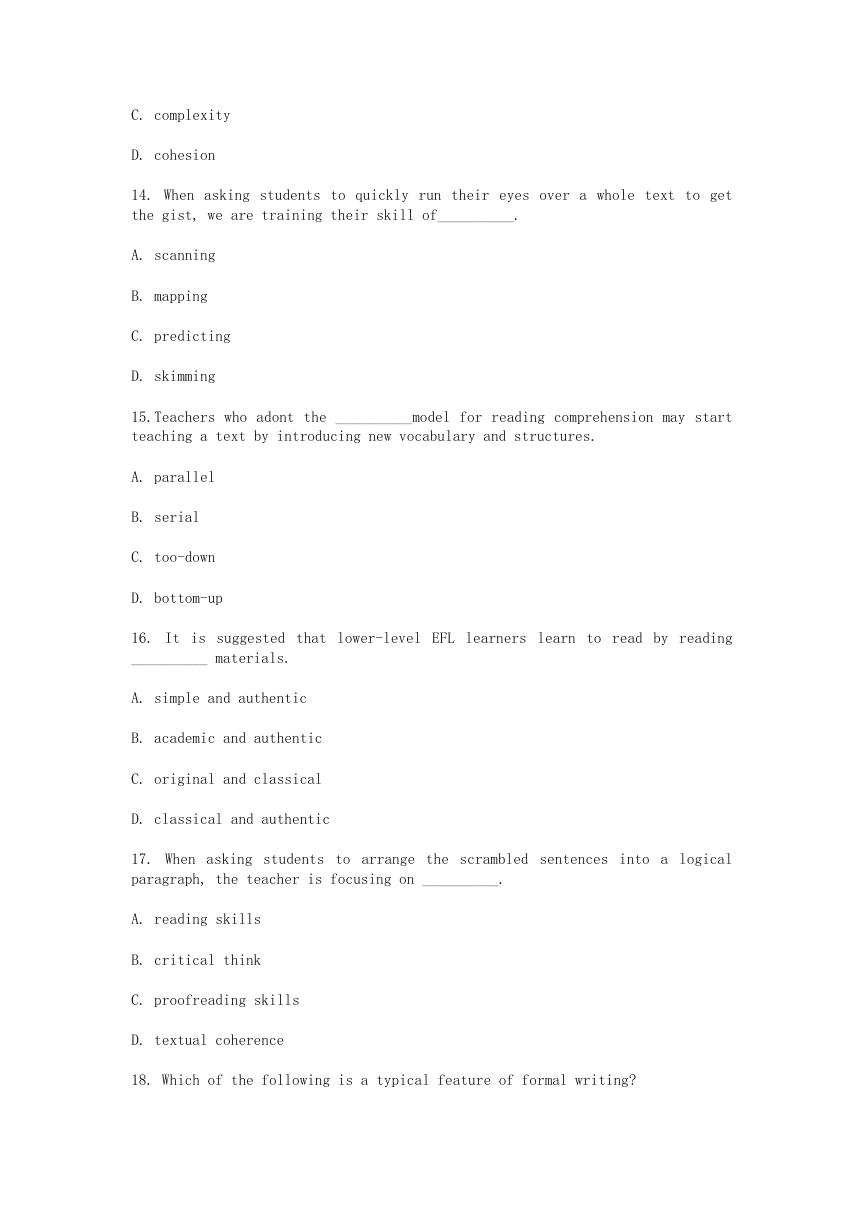
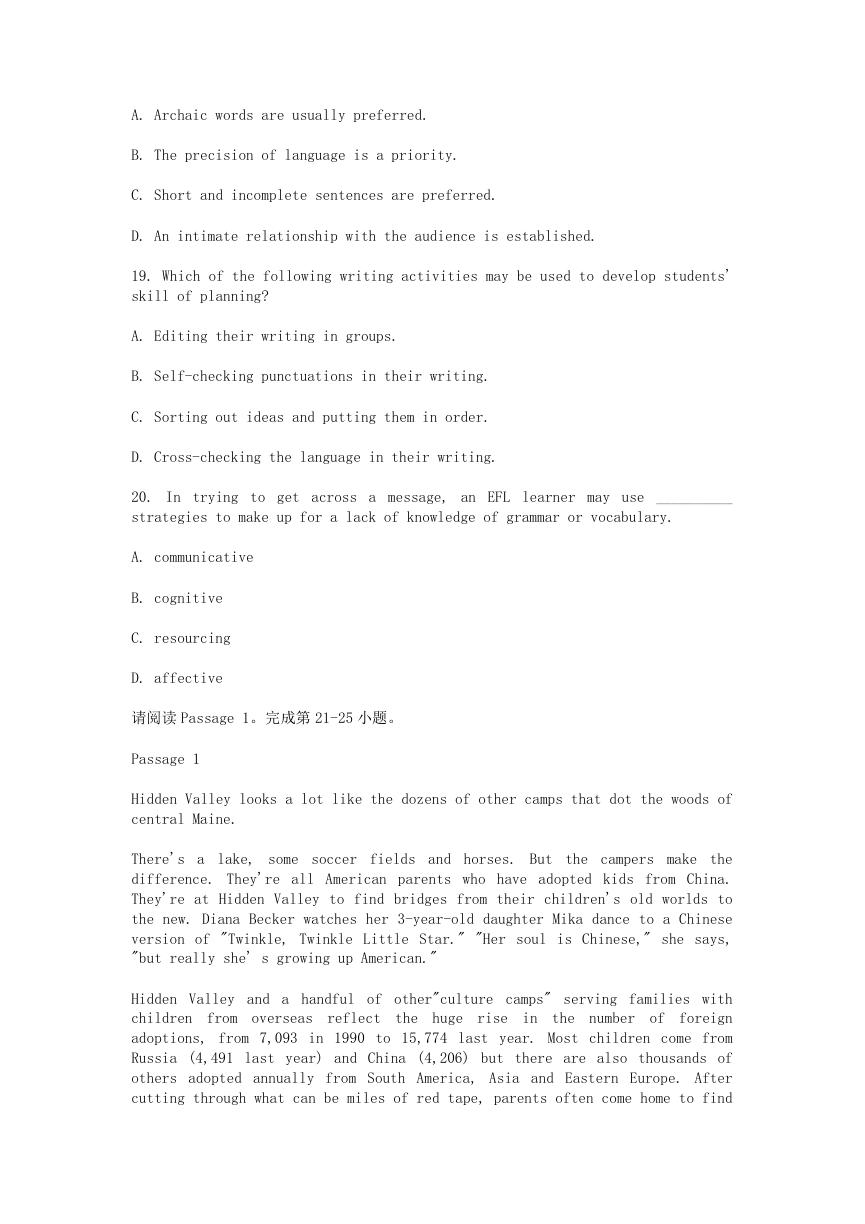
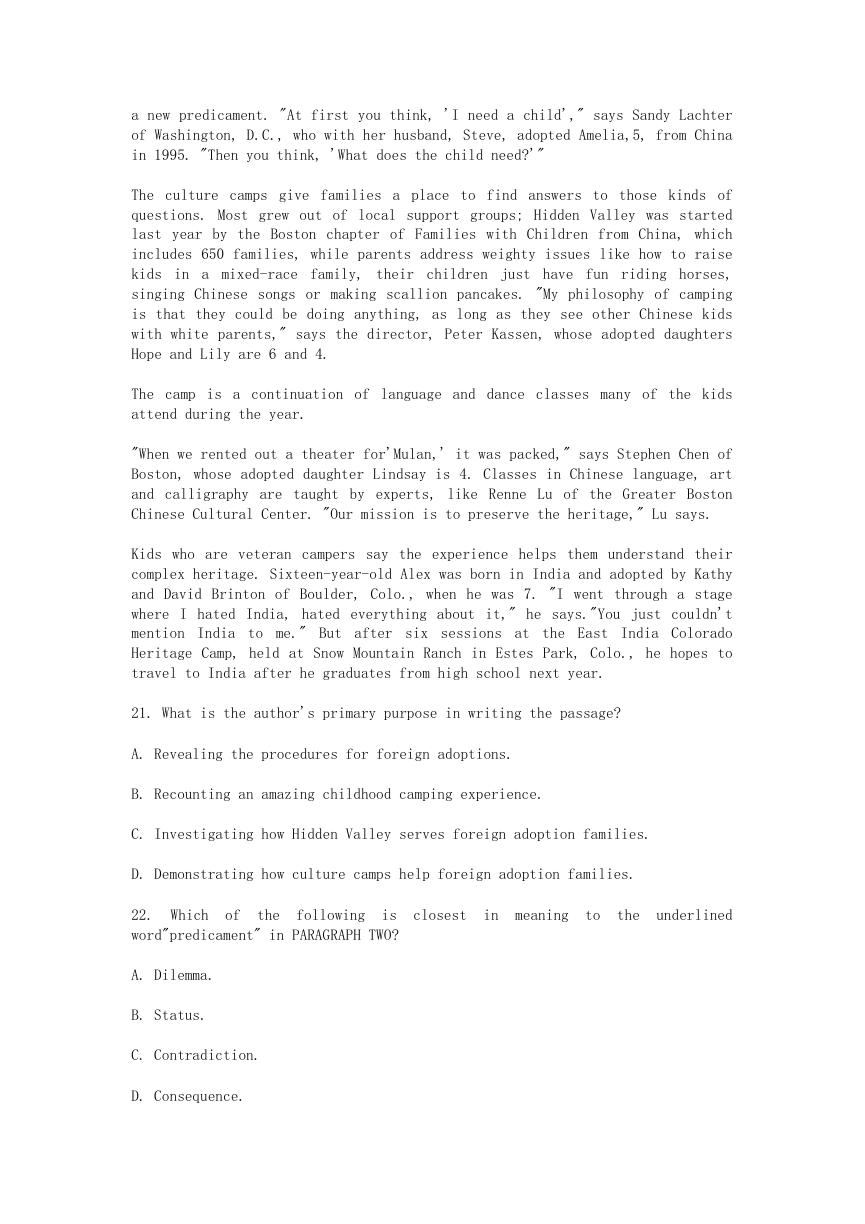
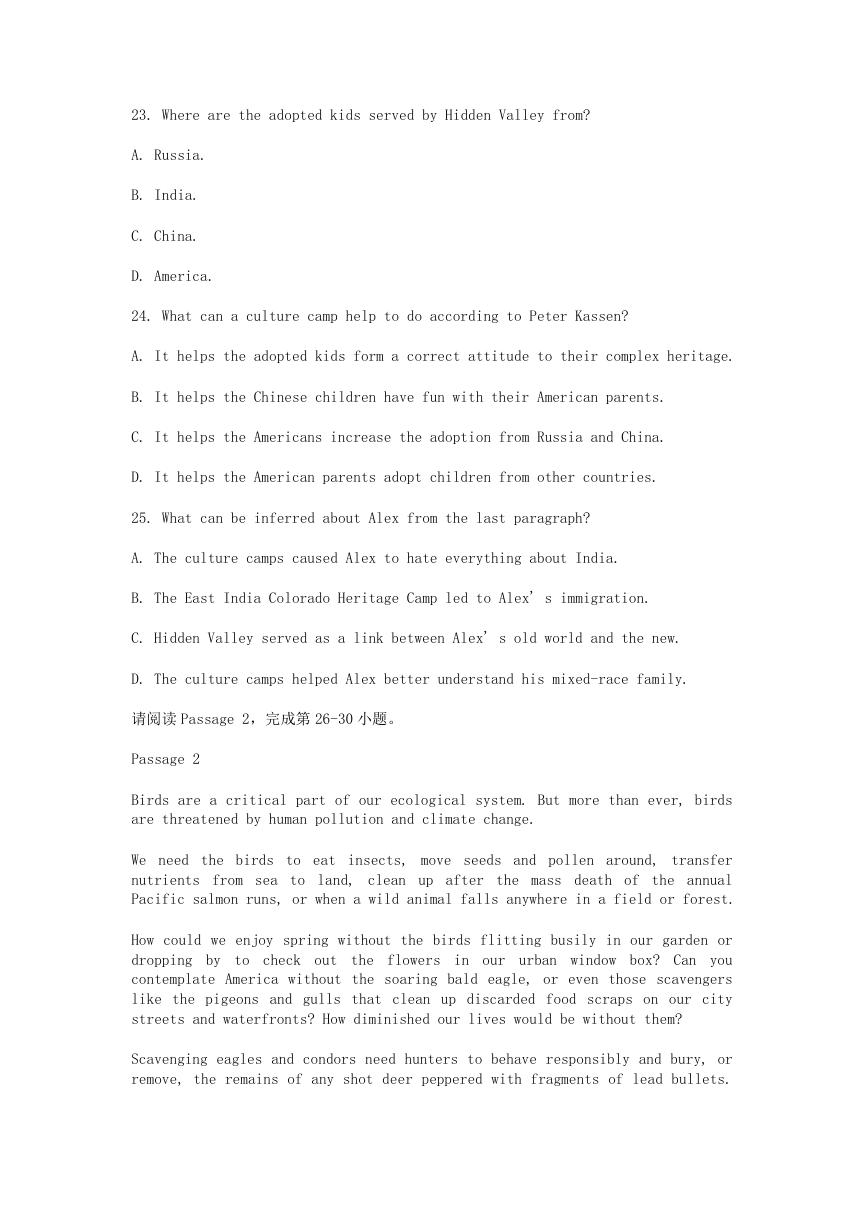
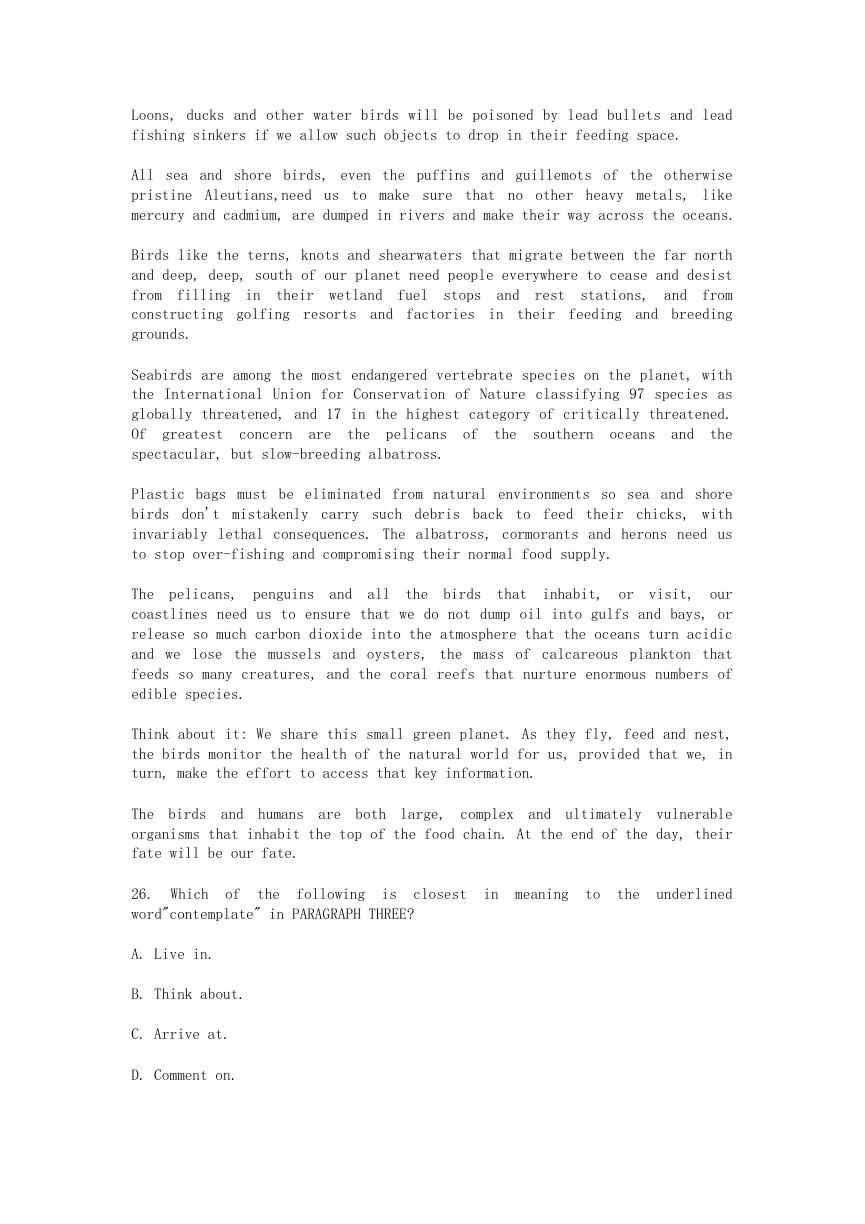








 2023年江西萍乡中考道德与法治真题及答案.doc
2023年江西萍乡中考道德与法治真题及答案.doc 2012年重庆南川中考生物真题及答案.doc
2012年重庆南川中考生物真题及答案.doc 2013年江西师范大学地理学综合及文艺理论基础考研真题.doc
2013年江西师范大学地理学综合及文艺理论基础考研真题.doc 2020年四川甘孜小升初语文真题及答案I卷.doc
2020年四川甘孜小升初语文真题及答案I卷.doc 2020年注册岩土工程师专业基础考试真题及答案.doc
2020年注册岩土工程师专业基础考试真题及答案.doc 2023-2024学年福建省厦门市九年级上学期数学月考试题及答案.doc
2023-2024学年福建省厦门市九年级上学期数学月考试题及答案.doc 2021-2022学年辽宁省沈阳市大东区九年级上学期语文期末试题及答案.doc
2021-2022学年辽宁省沈阳市大东区九年级上学期语文期末试题及答案.doc 2022-2023学年北京东城区初三第一学期物理期末试卷及答案.doc
2022-2023学年北京东城区初三第一学期物理期末试卷及答案.doc 2018上半年江西教师资格初中地理学科知识与教学能力真题及答案.doc
2018上半年江西教师资格初中地理学科知识与教学能力真题及答案.doc 2012年河北国家公务员申论考试真题及答案-省级.doc
2012年河北国家公务员申论考试真题及答案-省级.doc 2020-2021学年江苏省扬州市江都区邵樊片九年级上学期数学第一次质量检测试题及答案.doc
2020-2021学年江苏省扬州市江都区邵樊片九年级上学期数学第一次质量检测试题及答案.doc 2022下半年黑龙江教师资格证中学综合素质真题及答案.doc
2022下半年黑龙江教师资格证中学综合素质真题及答案.doc